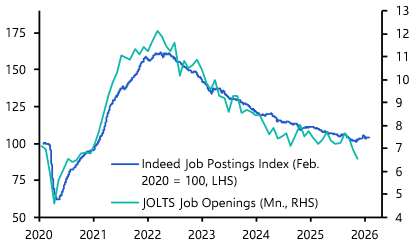New COVID-19 cases are surging in Europe with less than a month before the ECB's key 16th December meeting. We asked Andrew Kenningham how this new wave could affect the Governing Council's decision-making and the euro-zone economic outlook. Andrew is our Chief Europe Economist. He has overall responsibility for running our European economics service and contributes more generally to our international economic analysis.
Q: Andrew, this surge in new infections in Europe has become a major new source of uncertainty for markets. How problematic is fourth wave for the European growth outlook?
A: It's clearly a risk. Austria has already gone into a full lockdown and, although it's a relatively small economy, the parallels with the COVID situation in Germany are striking and the chances of fresh restrictions in Germany are rising. It comes down to what new restrictions are imposed, how long they're imposed for and how severe they are. Even if they aren't very tough, we're warning clients that if consumers become cautious in the face of this new wave then that could mean the euro-zone economy stagnates in Q4 after what was fairly robust Q3 growth.
Q: There had been growing speculation that the ECB would announce a withdrawal of pandemic support following its December meeting. Does this throw a spanner in the works?
A: Christine Lagarde had confirmed that the PEPP (Pandemic Emergency Purchase Programme) would end in March, because the crisis phase of the pandemic had passed, and we were expecting that to be confirmed in the December meeting. There's now a chance that the decision is delayed but, even without the PEPP, the ECB has flexibility to continue monthly asset purchases via the APP (Asset Purchase Programme).
Q: You’ve been highlighting the idea of a “looser for longer” policy stance than the consensus on the ECB is anticipating. How does that fit with market speculation earlier in the autumn that rates could rise next year?
A: Yields spiked after the October meeting but that was followed by a concerted communications effort to rein in expectations for a near-term rate hike – and with good reason. One of the conditions for lift-off is that inflation must be expected to be 2% “durably for the rest of the projection horizon”, in the ECB’s own language, and we don’t think that will feature in the Bank’s forecasts for at least the next year – and probably not even in 2023.
Q: But euro-zone inflation is currently running at well over 2% and you recently raised your German inflation forecasts. What are the risks of an inflation surprise on the upside?
A: We’ve raised our German inflation forecasts for this year and next but we still expect inflation to fall back sharply towards the end of next year – both in Germany, and in the euro-zone as a whole. Yes, there’s a risk that inflation takes longer to fall back below 2% because of supply problems, but the medium-term outlook looks reasonably benign, in part because the drivers of wage inflation are relatively constrained in the euro-zone.
Q: That’s quite different from what we’re seeing in the US, where we've identified structural labour market problems which we think will keep inflation high. Why is the euro-zone different?
A: There are growing worries about labour market shortages in some sectors, but the labour force hasn't contracted nearly as much as it has in the US. And, given that there has not been a wave of early retirement in the euro-zone, we think the vast majority of those who dropped out of the workforce during the pandemic will come back. What’s more, there's a tradition and culture of wage restraint in those parts of the region where the labour market is tightened, like Germany, whereas those areas where wage inflation is more common, Spain, for instance, are still struggling with weak demand. All of this should keep wage pressures at bay.
More from our Europe team:
- The shifting nature of European wage agreements is one reason why high headline inflation may not feed into wages.
- How are supply shortages affecting the euro-zone economic outlook?
- Jessica Hinds discussed the euro-zone's Q3 GDP release.



